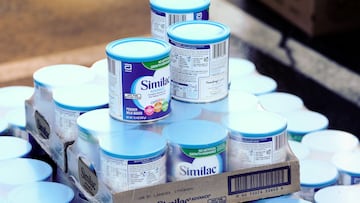Baby formula: why is there a shortage in the US and when could it end
A lack of baby formula has become more acute in the US, sparked by a recall from the biggest producer. The FDA says that it is working to secure supplies.

American consumers have been dealing with one issue after another as disruptions from the covid-19 pandemic keep popping up. One of the latest is a shortage of baby formula that is growing more acute forcing more retailers to place limits per customer on purchases.
Although the shortage is not uniform across the US, the most recent analysis from Datasembly reports that 43 percent of top-selling baby formula products were out of stock. The stocking challenge began in July 2021 and accelerated in December, well before the biggest producer ordered a recall.
Also see:
What is causing the baby formula shortage?
A number of factors are worsening what had been a the baby formula nuisance into a full-blown crisis in the United States. Mainly it comes down to supply chain issues, which is one of the drivers of rising prices, in turn inflation has only worsened the situation.
Even before Abbot declared a voluntary recall for certain lots of Similac, Alimentum and EleCare with expiration dates of 1 April 2022, or later, at the end of February out-of-stock levels were over 25 percent. The sudden removal from the market of products from the biggest suppliers of milk formula, Abbott products accounted for around 42 percent market share in 2021, drastically exacerbated an already worsening situation.
The recall was issued after complaints of children falling ill with bacterial infections after consuming baby formula that was produced at an Abbott facility in Sturgis, Michigan. In all there were four cases, two of which resulted in the death of the infant.
Where is baby formula most out of stock?
There are 25 states and Washington DC where the out-of-stock levels are between 40 percent and 50 percent. The situation is most dire in Tennessee at 54 percent of the top selling brands absent from store shelves. Iowa, North Dakota, South Dakota and Texas have all breached the 50 percent out-of-stock level.
In an effort to secure that everyone has access to the dwindling supply of formula milk, some retailers have placed restrictions on how much each customer can buy with each purchase.
Walmart and Target are allowing people to buy five containers of formula each day, while Target’s online buyers are capped at four items.
Kroger limits each customer to four products.
Shoppers at Walgreens and CVS, in-store and online, are limited to three infant and toddler formula products per transaction.
Parents across the country are facing a crisis as supply chain issues and recalls have caused a massive baby formula shortage. @jolingkent has the latest. pic.twitter.com/8lOvhw7rae
— TODAY (@TODAYshow) May 12, 2022
When will the baby formula shortage end?
The FDA has given Abbot clearance to restart production after an internal investigation concluded that the Michigan facility was unlikely to be the source of the infections. The facility could resume production within two weeks, but it will take another six to eight weeks before those products will be on the shelves.
The company is also importing product on a daily basis from its FDA-approved facility in Ireland via air shipments to fill the gap in supplies according to a statement. The food safety agency for its part has been working with producers and doing everything within its “power to ensure there is adequate product available where and when,” it is needed.
Warnings about homemade baby formula and second hand suppliers
Notably, sales of baby formula increased in April as supplies began to become scarcer. Some experts put the rapid drop in stock to panic buying and stockpiling by worried parents. However, there are reports that some unscrupulous individuals have taken to the internet to sell baby formula above the market rate. The New York Attorney General issued a warning that such practices are illegal and should be reported to authorities.
Related stories
The FDA is also warning not to make DIY milk formula because “it may lack nutrients vital to an infant’s growth.” Doctors warn not to dilute baby formula with extra water, this could be harmful to a baby’s kidneys which aren’t mature enough to process the excess water.
For those whose children require special formulations of milk formula, the FDA is not objecting to Abbott “releasing product to individuals needing urgent, life-sustaining supplies of certain specialty and metabolic formulas on a case-by-case basis,” that are in-stock but on hold at the Sturgis facility. You should consult your healthcare provider about whether accessing these products outweighs the potential risk of bacterial infection.


